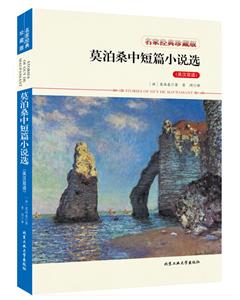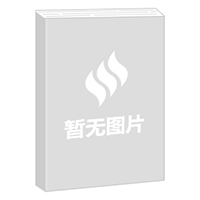-
>
老人与海
-
>
统编高中语文教材名师课堂教学实录
-
>
世界经典文学名著系列注音版:小妇人(九品)
-
>
名家经典:水浒传(上下册)
-
>
中考现代文阅读答题必备公式(备考2023)
-
>
米·伊林十万个为什么(导读版)
-
>
经典阅读:青少年人文素养丛书--话本选
莫泊桑中短篇小说选:英汉双语 版权信息
- ISBN:9787563952762
- 条形码:9787563952762 ; 978-7-5639-5276-2
- 装帧:暂无
- 册数:暂无
- 重量:暂无
- 所属分类:>
莫泊桑中短篇小说选:英汉双语 本书特色
★荟萃“短篇小说之王”经典作品。 ★初高中语文必读名著,展现法语魅力的典范。 ★全面反映十九世纪后半期法国社会风貌和人情世态。充满戏剧张力的故事,行云流水的文笔,精湛的艺术表现手法,定让您手不释卷!
莫泊桑中短篇小说选:英汉双语 内容简介
本书主要内容包括: “西蒙的爸爸”、“我的叔叔于勒”、“米隆老爹”、“两个朋友”、“一截细绳”、“在河上”、“俘虏”、“衣橱”、“雨伞”、“树林里”、“钻石项链”等文学作品。
莫泊桑中短篇小说选:英汉双语 目录
My Uncle Jules / 我的叔叔于勒 12
Father Milon / 米隆老爹 22
Two Friends / 两个朋友 31
The Piece of String / 一截细绳 41
On the River / 在河上 50
The Prisoners / 俘虏 58
The Wardrobe / 衣橱 72
The Umbrella / 雨伞 81
In the Wood / 树林里 92
Happiness / 幸福 98
The Diamond Necklace / 钻石项链 106
A Duel / 一场决斗 117
A Stroll / 散步 124
The Blind Man / 盲人 132
The Relic / 圣骨 137
The Wolf / 狼 144
The Devil / 魔鬼 152
Mademoiselle Fifi / 菲菲小姐 161
That Costly Ride / 骑马的代价 176
Clair de Lune / 月光 186
The Little Cask / 小酒桶 193
The False Gems / 珠宝 201
A Coup d’Etat / 一次政变 210
Mademoiselle Pearl / 珍珠小姐 224
Boule de Suif / 羊脂球 244
莫泊桑中短篇小说选:英汉双语 节选
Noon had just struck. The school door opened and the youngsters darted out, jostling each other in their haste to get out quickly. But instead of promptly dispersing and going home to dinner as usual, they stopped a few paces off, broke up into knots, and began whispering. The fact was that, that morning, Simon, the son of La Blanchotte, had, for the first time, attended school. They had all of them in their families heard talk of La Blanchotte; and, although in public she was welcome enough, the mothers among themselves treated her with a somewhat disdainful compassion, which the children had imitated without in the least knowing why. As for Simon himself, they did not know him, for he never went out, and did not run about with them in the streets of the village, or along the banks of the river. And they did not care for him; so it was with a certain delight, mingled with considerable astonishment, that they met and repeated to each other what had been said by a lad of fourteen or fifteen who appeared to know all about it, so sagaciously did he wink. “You know—Simon—well, he has no papa.” Just then La Blanchotte’s son appeared in the doorway of the school. He was seven or eight years old, rather pale, very neat, with a timid and almost awkward manner. He was starting home to his mother’s house when the groups of his schoolmates, whispering and watching him with the mischievous and heartless eyes of children bent upon playing a nasty trick, gradually closed in around him and ended by surrounding him altogether. There he stood in their midst, surprised and embarrassed, not understanding what they were going to do with him. But the lad who had brought the news, puffed up with the success he had met with already, demanded: “What is your name?” He answered: “Simon.” “Simon what?” retorted the other. The child, altogether bewildered, repeated: “Simon.” The lad shouted at him: “One is named Simon something—that is not a name—Simon indeed.” The child, on the brink of tears, replied for the third time: “My name is Simon.” The urchins began to laugh. The triumphant tormentor cried: “You can see plainly that he has no papa.” A deep silence ensued. The children were dumfounded by this extraordinary, impossible, monstrous thing—a boy who had not a papa; they looked upon him as a phenomenon, an unnatural being, and they felt that hitherto inexplicable contempt of their mothers for La Blanchotte growing upon them. As for Simon, he had leaned against a tree to avoid falling, and he remained as if prostrated by an irreparable disaster. He sought to explain, but could think of nothing to say to refute this horrible charge that he had no papa. At last he shouted at them quite recklessly: “Yes, I have one.” “Where is he?” demanded the boy. Simon was silent, he did not know. The children roared, tremendously excited; and those country boys, little more than animals, experienced that cruel craving which prompts the fowls of a farmyard to destroy one of their number as soon as it is wounded. Simon suddenly espied a little neighbor, the son of a widow, whom he had seen, as he himself was to be seen, always alone with his mother. “And no more have you,” he said; “no more have you a papa.” “Yes,” replied the other, “I have one.” “Where is he?” rejoined Simon. “He is dead,” declared the brat, with superb dignity; “he is in the cemetery, is my papa.” A murmur of approval rose among the little wretches as if this fact of possessing a papa dead in a cemetery had caused their comrade to grow big enough to crush the other one who had no papa at all. And these boys, whose fathers were for the most part bad men, drunkards, thieves, and who beat their wives, jostled each other to press closer and closer, as though they, the legitimate ones, would smother by their pressure one who was illegitimate. The boy who chanced to be next Simon suddenly put his tongue out at him with a mocking air and shouted at him: “No papa! No papa!” Simon seized him by the hair with both hands and set to work to disable his legs with kicks, while he bit his cheek ferociously. A tremendous struggle ensued between the two combatants, and Simon found himself beaten, torn, bruised, rolled on the ground in the midst of the ring of applauding schoolboys. As he arose, mechanically brushing with his hand his little blouse all covered with dust, some one shouted at him: “Go and tell your papa.” Then he felt a great sinking at his heart. They were stronger than he was, they had beaten him, and he had no answer to give them, for he knew well that it was true that he had no papa. Full of pride, he attempted for some moments to struggle against the tears which were choking him. He had a feeling of suffocation, and then without any sound he commenced to weep, with great shaking sobs. A ferocious joy broke out among his enemies, and, with one accord, just like savages in their fearful festivals, they took each other by the hand and danced round him in a circle, repeating as a refrain: “No papa! No papa!” But suddenly Simon ceased sobbing. He became ferocious. There were stones under his feet; he picked them up and with all his strength hurled them at his tormentors. Two or three were struck and rushed off yelling, and so formidable did he appear that the rest became panic-stricken. Cowards, as the mob always is in presence of an exasperated man, they broke up and fled. Left alone, the little fellow without a father set off running toward the fields, for a recollection had been awakened in him which determined his soul to a great resolve. He made up his mind to drown himself in the river. He remembered, in fact, that eight days before, a poor devil who begged for his livelihood had thrown himself into the water because he had no more money. Simon had been there when they fished him out again; and the wretched man, who usually seemed to him so miserable, and ugly, had then struck him as being so peaceful with his pale cheeks, his long drenched beard, and his open eyes full of calm. The bystanders had said: “He is dead.” And some one had said: “He is quite happy now.”……
莫泊桑中短篇小说选:英汉双语 作者简介
莫泊桑,全名是居伊·德·莫泊桑(Guy de Maupassant 1850--1893),19世纪后半期法国优秀的批判现实主义作家曾拜法国著名作家福楼拜为师。一生创作了6部长篇小说和350多篇中短篇小说他的文学成就以短篇小说为突出是与契诃夫和欧?亨利并列的世界三大短篇小说巨匠之一对后世产生极大影响。译者:青闰(1965~),河南武陟人。本名宋金柱,常用笔名听泉、宣碧。现供职于焦作大学翻译中心。擅长双语互译。迄今已在外文出版社、译林出版社、上海交通大学出版社、东华大学出版社、大连理工大学出版社、中国宇航出版社等出版双语著作多部。另在《世界文学》《译林》《当代外国文学》《英语世界》等重要报刊发表译文和论文多篇。他翻译的原则是:“以雅俗共赏为基点,注重选材的广度、深度和科学性,整体把握字词句段篇,力求做到形声色味神的完美统一。”
- >
经典常谈
经典常谈
¥16.3¥39.8 - >
月亮虎
月亮虎
¥20.2¥48.0 - >
罗庸西南联大授课录
罗庸西南联大授课录
¥13.8¥32.0 - >
小考拉的故事-套装共3册
小考拉的故事-套装共3册
¥36.7¥68.0 - >
莉莉和章鱼
莉莉和章鱼
¥19.7¥42.0 - >
中国历史的瞬间
中国历史的瞬间
¥16.7¥38.0 - >
人文阅读与收藏·良友文学丛书:一天的工作
人文阅读与收藏·良友文学丛书:一天的工作
¥14.7¥45.8 - >
唐代进士录
唐代进士录
¥15.1¥39.8
-
飘
¥26.8¥68 -
4.23文创礼盒A款--“作家言我精神状态”
¥42.3¥206 -
4.23文创礼盒B款--“作家言我精神状态”
¥42.3¥206 -
一句顶一万句 (印签版)
¥40.4¥68





















